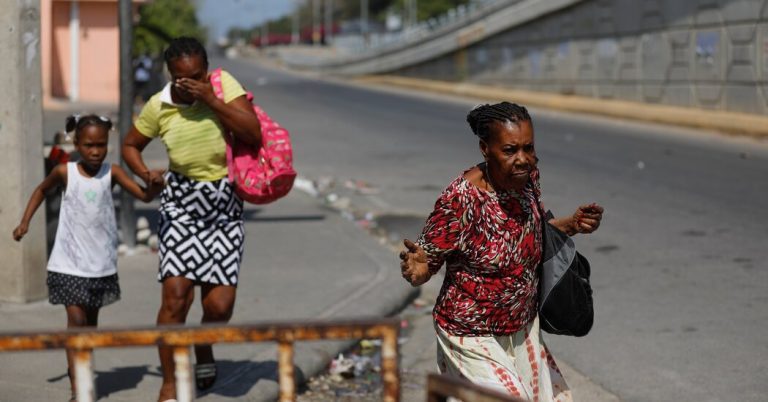The security crisis in Haiti is reaching a tipping point. An alliance of armed gangs is pressuring the country’s prime minister to resign, putting the United States in the middle of a power struggle that is gripping the country. Aiming to defuse the conflict, the Biden administration is increasing pressure on Prime Minister Ariel Henry to allow the transfer of power.
The United States was not “calling or pressuring him to resign,” said Matthew Miller, a State Department spokesman. However, he added, “we urge him to expedite the transition to a strong and inclusive governance structure.”
The impasse marks a major turning point in Haiti, which has been plagued by near-perpetual crises in recent years as tempers flare in the country of 11.5 million over spreading unrest, food shortages and a lack of progress in transitioning democracy, elections and the restoration of a sense of security.
The standoff came after Mr. Henry, who has been supported by the United States since becoming Haiti’s de facto leader after the 2021 assassination of President Jovenel Moïse, was unable to return to Haiti on Tuesday because of doubts about a safe landing at the airport in the capital Port-au-Prince, which has been the target of gang attacks in recent days.
Mr. Henry, since landing in Puerto Rico on Tuesday, has made no public statement about his whereabouts or plans to return to Haiti. Meanwhile, as scenes of looting and mayhem have crowded Port-au-Prince on edge, gang leaders have rushed to fill a power vacuum.
“If Ariel Henry does not step down, if the international community continues to support him, we are heading straight for a civil war,” Jimmy Chérizier, a top gang leader and ex-policeman better known as Barbecue, told reporters in Port. -o-Prince on Tuesday.
Mr Chérizier and other gang leaders have been on the rampage around Port-au-Prince in the past week, clashing with police and attacking the airport, bank offices, government buildings and prisons, including the country’s largest penitentiary, allowing thousands prisoners to escape.
The deteriorating security situation limits the options available to the United States, which has traditionally wielded enormous influence over Haitian politics. The Biden administration has made clear there are no plans to deploy US troops to Haiti to enforce order.
“What we have asked the Haitian prime minister to do is to move forward with a political process that will lead to the establishment of a presidential transition council that will lead to elections,” said Linda Thomas-Greenfield, the US ambassador to the United Nations. he told reporters on Wednesday. “And we believe that this is urgent — that it is urgent to move in this direction and begin the process of restoring normalcy to the people of Haiti.”
A US government official said Caricom, an association of 15 Caribbean countries, was at the forefront of calls for Haiti’s prime minister to step down immediately, while the United States felt it should support Mr Henry as he gave the better opportunity to ensure a smooth transition and electoral process.
The official, who spoke on background to discuss sensitive issues, added that the United States has no partner other than Haiti that would serve as an alternative to Mr. Henry. The official said demanding the prime minister’s resignation immediately would create more chaos in a country already on the brink of collapse.
“Now they’re stuck with something even more unpleasant, with no way out, no alternative to the crisis,” said Robert Fatton, a Haiti expert at the University of Virginia, referring to the Biden administration’s choices on Haiti. “Gangs are overwhelmingly dominant now.”
Gang violence is exacerbating an already acute humanitarian crisis in Haiti. About 15,000 people have been forced from their homes in recent days by escalating violence, including many who had already been displaced, said Martin Griffiths, the United Nations emergency relief coordinator.
Widespread hunger is another pressing concern, with an estimated 1.4 million people in the country currently facing emergency levels of hunger, according to the World Food Programme.
Overall, “nearly half the population is in need of humanitarian assistance,” said Mr. Griffiths, who is also the UN Under-Secretary-General for Humanitarian Affairs. “The crisis in Haiti is worsening at an alarming rate.”
The deepening sense of chaos in Haiti also raises doubts about a plan for Kenya to lead a security mission in Haiti, which the Biden administration has pushed for over the past year. Mr Henry had flown to Nairobi last week and on Friday signed the agreement with the Kenyan authorities.
Under the plan, Kenya would provide at least 1,000 police officers for the mission, which the United States has pledged to support with $200 million and Canada with nearly $60 million. Other countries, including Benin, Chad, Bangladesh and Barbados, have also committed to sending personnel to the mission.
“This agreement was signed by someone without legitimacy,” said Monique Clesca, a Haitian democracy activist and former United Nations official, noting that Haiti’s currently defunct parliament and possibly its future leader he will have to approve the agreement for the mission to move forward.
Michael Crowley, Natalie Kitroeff, David C. Adams, Andre Poltre and Francis Robles contributed to the report.




